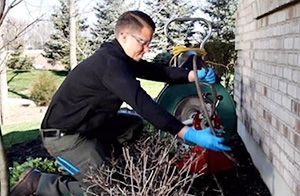 Clogged drains are something that every homeowner dreads. Depending on the extent of the clog and the damage that may have occurred from prolonged backup, drain clogs can be expensive, time-consuming and harmful to your family’s health. A clogged drain definitely can be tricky.
Clogged drains are something that every homeowner dreads. Depending on the extent of the clog and the damage that may have occurred from prolonged backup, drain clogs can be expensive, time-consuming and harmful to your family’s health. A clogged drain definitely can be tricky.
Larger clogs can cause backups in and put a strain on municipal sewage and wastewater system, leading to potential environmental issues. However, costly clogs can be avoided with proper drain maintenance.
The Causes
First, it’s best to know what causes a sewer clog. Here are some reasons:
- The main drain backs up if there is a root intrusion.
- The drain itself is broken.
- An overload of toilet paper or wipes flushed down the drain.
- Small drains like the bathroom sink, tub or kitchen sink can be clogged due to buildup of hair, soap scum, hair styling products, or food.
What to Look For
Most of the time there are some symptoms that a drain is becoming restricted. Know the signs of a clog:
- Water will begin to drain more slowly in small drains.
- You might hear gurgling in the drain or see air bubbles come up.
How Can Clogs Be Prevented?
- Keep an eye on small drains, and call a plumber if you start to see the signs of a blockage.
- Get the problem taken care of before it becomes a mess.
- Korrect offers an environmentally friendly product that you can put down smaller drains on a monthly basis to help prevent sludge and scum buildup.
- If you have root intrusion problems in your main drain line from the house to the city sewer at the street, regular preventative drain cleanings to remove the roots is recommended.
Maintaining clog-free drains is easy, once you know how to take care of them. If you are mindful of what you put down your drains, you really shouldn’t need to clear them of debris very often — maybe once a month or so. However, some drains will need to be checked on a more regular basis, particularly a bathtub or shower and bathroom sink drains because that’s usually where hair becomes a problem. Perform general maintenance once a week by lifting up stoppers and removing any debris.
